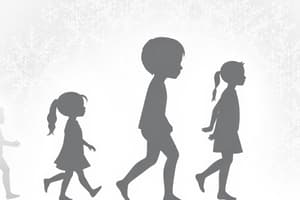Podcast
Questions and Answers
Which theory emphasizes the importance of early childhood experiences in shaping personality development?
Which theory emphasizes the importance of early childhood experiences in shaping personality development?
- Psychodynamic Theory (correct)
- Cognitive Developmental Theory
- Ecological Systems Theory
- Social Learning Theory
What is the first stage of Piaget's cognitive development?
What is the first stage of Piaget's cognitive development?
- Concrete operational
- Sensorimotor (correct)
- Formal operational
- Preoperational
What does Bandura's Social Learning Theory suggest about behavior acquisition?
What does Bandura's Social Learning Theory suggest about behavior acquisition?
- It occurs through observational learning and modeling. (correct)
- It is solely a result of genetic factors.
- It is achieved through reinforcement only.
- It is primarily instinctual.
In Bronfenbrenner's Ecological Systems Theory, which of the following is part of the microsystem?
In Bronfenbrenner's Ecological Systems Theory, which of the following is part of the microsystem?
Which of the following stages is NOT part of prenatal development?
Which of the following stages is NOT part of prenatal development?
How does Piaget's theory assist educators in instructional strategies?
How does Piaget's theory assist educators in instructional strategies?
What aspect of development does Ecological Systems Theory primarily focus on?
What aspect of development does Ecological Systems Theory primarily focus on?
Which statement best describes the time frame of prenatal development?
Which statement best describes the time frame of prenatal development?
What does life span development primarily study?
What does life span development primarily study?
How can knowledge of life span development be applied in education?
How can knowledge of life span development be applied in education?
What role does psychoanalytic theory play in understanding life span development?
What role does psychoanalytic theory play in understanding life span development?
What is one practical application of understanding life span development in healthcare?
What is one practical application of understanding life span development in healthcare?
What does life span development emphasize regarding individual growth?
What does life span development emphasize regarding individual growth?
Which of the following best describes an outcome of studying life span development?
Which of the following best describes an outcome of studying life span development?
In Freud’s theory, what does the oral stage focus on?
In Freud’s theory, what does the oral stage focus on?
What is a key characteristic of life span development as a field of study?
What is a key characteristic of life span development as a field of study?
How does understanding age-related changes influence healthcare practices?
How does understanding age-related changes influence healthcare practices?
What role does developmental research play in social policies?
What role does developmental research play in social policies?
What is emphasized by the life span development perspective?
What is emphasized by the life span development perspective?
Which of the following factors can negatively impact fetal development?
Which of the following factors can negatively impact fetal development?
What is a key benefit of understanding developmental processes?
What is a key benefit of understanding developmental processes?
What should be explored to deepen understanding of life span development?
What should be explored to deepen understanding of life span development?
What is a key characteristic of attachment theory according to Bowlby?
What is a key characteristic of attachment theory according to Bowlby?
Which cognitive ability is typically developed during middle childhood?
Which cognitive ability is typically developed during middle childhood?
What developmental phase is defined by physical changes due to puberty?
What developmental phase is defined by physical changes due to puberty?
According to Erikson, what is a central task of adulthood?
According to Erikson, what is a central task of adulthood?
What impact does peer relationships have during middle childhood?
What impact does peer relationships have during middle childhood?
What is the primary focus of individuals in middle adulthood, according to Erikson?
What is the primary focus of individuals in middle adulthood, according to Erikson?
During which developmental stage is emotional attachment to caregivers primarily formed?
During which developmental stage is emotional attachment to caregivers primarily formed?
What is one significant physical change that often occurs in older adulthood?
What is one significant physical change that often occurs in older adulthood?
Which factor may influence the psychological well-being of older adults?
Which factor may influence the psychological well-being of older adults?
What does the nature vs. nurture debate focus on?
What does the nature vs. nurture debate focus on?
Which theory exemplifies a stage-based perspective on development?
Which theory exemplifies a stage-based perspective on development?
In the context of stability vs. change, what do longitudinal studies aim to investigate?
In the context of stability vs. change, what do longitudinal studies aim to investigate?
How can developmental theories be effectively utilized in educational settings?
How can developmental theories be effectively utilized in educational settings?
What aspect of personality is studied under the stability vs. change theme in development?
What aspect of personality is studied under the stability vs. change theme in development?
What implication does the continuity vs. discontinuity theory have on understanding human development?
What implication does the continuity vs. discontinuity theory have on understanding human development?
Flashcards are hidden until you start studying
Study Notes
Definition of Life Span Development
- Life span development studies individual growth, change, and stability from conception to death.
- Examines biological, cognitive, emotional, and social development across various life stages and contexts.
- Recognizes development as a lifelong process influenced by biological, psychological, and environmental factors.
- Emphasizes the interconnectedness of growth and change throughout life stages.
Importance of Studying Life Span Development
- Insight into Human Behavior: Provides understanding of behavior, thoughts, and emotions at different life stages; aids educators in recognizing cognitive differences in children.
- Practical Applications:
- Education: Informs tailored teaching methods based on students' developmental stages.
- Healthcare: Facilitates age-appropriate interventions reflecting developmental needs.
- Social Services: Guides policy design to support individuals through various life stages.
- Personal Growth: Enhances self-awareness and resilience through understanding common developmental patterns.
Theoretical Foundations in Life Span Development
- Psychoanalytic Theory (Freud):
- Proposes personality development through stages involving conflicts between biological drives and societal expectations.
- Emphasizes the importance of unconscious motivations and early childhood experiences.
- Cognitive Developmental Theory (Piaget):
- Identifies four cognitive stages: sensorimotor, preoperational, concrete operational, and formal operational, each with unique thinking processes.
- Assists educators in promoting intellectual growth based on children’s evolving thought patterns.
- Social Learning Theory (Bandura):
- Highlights observational learning and modeling as key factors in behavior development.
- Explains how children learn from parents, peers, and media by imitating rewarded behaviors.
- Ecological Systems Theory (Bronfenbrenner):
- Outlines multiple environmental influences (microsystem to macrosystem) shaping development.
- Helps in understanding how context impacts individual outcomes.
Developmental Periods
- Prenatal Development:
- Consists of germinal, embryonic, and fetal stages crucial for organ and neural development.
- Influenced by genetics, maternal nutrition, exposure to toxins, and prenatal care.
- Infancy and Early Childhood:
- Characterized by milestones such as motor skills, language acquisition, and attachment formation.
- Secure attachments support emotional regulation and future social relationships.
- Middle Childhood:
- Cognitive advances lead to logical reasoning and problem-solving growth.
- Peer relationships gain importance, influencing social skills and self-esteem.
- Adolescence:
- Marked by puberty, identity formation, and social challenges.
- Involves exploring personal values and adapting to peer pressure.
- Adulthood:
- Involves mastering intimacy versus isolation, career establishment, and societal contributions.
- Focus on generativity vs. stagnation characterized middle adulthood’s developmental tasks.
- Old Age:
- Involves physical decline, mobility changes, and increasing chronic illness susceptibility.
- Psychological adjustments relate to retirement and social changes, influenced by resilience and support networks.
Themes in Life Span Development
- Nature vs. Nurture: Ongoing debate on genetics' versus environmental factors' roles in development, with advancements in genetics highlighting their interplay.
- Continuity vs. Discontinuity: Theories vary on whether development is gradual or occurs in distinct stages; Piaget's theory exemplifies stage-based development.
- Stability vs. Change: Studies investigate the continuity of traits and behaviors versus transformations influenced by experiences, typically through longitudinal research.
Applications and Implications
- Educational Settings: Insights from developmental theories improve teaching effectiveness by aligning with children’s cognitive and emotional needs.
- Healthcare Practices: Familiarity with age-related changes aids in developing medical interventions tailored to individuals' developmental stages.
- Social Policies: Research drives the creation of policies supporting different life stage needs, addressing early education, healthcare access, and elder care.
Conclusion
- Importance of Lifelong Learning: Emphasizes continuous growth and adaptation, empowering individuals to navigate challenges and foster resilience.
- Next Steps: Continued exploration of developmental theories and practical applications contributes to advancements in psychology, education, healthcare, and policy for improved societal outcomes.
Studying That Suits You
Use AI to generate personalized quizzes and flashcards to suit your learning preferences.




